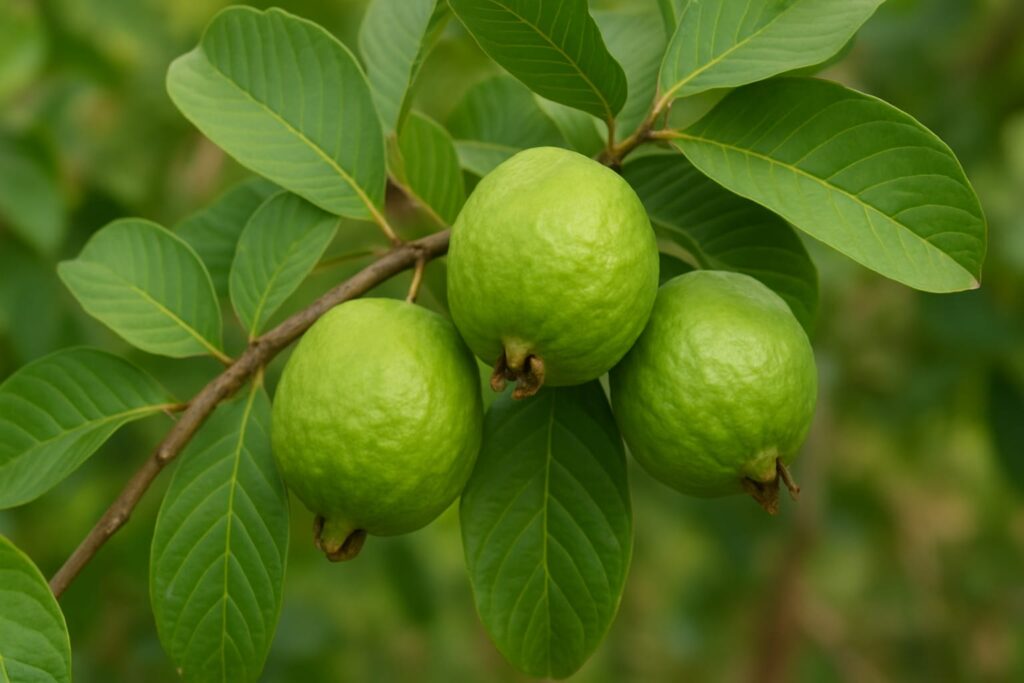Guava Benefits and Nutritional Information: A Complete Guide
Guava benefits and nutritional information are becoming increasingly popular among health-conscious individuals. This tropical fruit, native to Central America and widely cultivated in Asia and other tropical regions, offers not only a sweet taste but also an impressive nutritional profile. Packed with vitamins, minerals, antioxidants, and dietary fiber, guava is considered one of the most nutrient-dense fruits available. In this article, we will explore the various health benefits of guava, provide detailed nutritional facts, and explain why this fruit deserves a place in your daily diet.

Guava Benefits and Nutritional Information: Why It Matters
Guava benefits and nutritional information are essential for understanding how this fruit can support a healthy lifestyle. Unlike many other fruits, guava contains a unique balance of vitamin C, fiber, and antioxidants. These compounds work together to strengthen the immune system, aid digestion, and protect against chronic diseases. Because guava is both low in calories and high in nutrients, it is an ideal choice for individuals seeking to improve overall health while maintaining a balanced diet.
Guava Benefits and Nutritional Information for Immune Health
One of the most remarkable guava benefits and nutritional information points relates to immune support. Guava is an extraordinary source of vitamin C, providing more than double the recommended daily intake in a single serving. In fact, guava contains nearly four times more vitamin C than an orange. This high concentration of vitamin C helps the body fight infections, accelerates wound healing, and enhances collagen production for healthy skin. Moreover, the presence of antioxidants protects immune cells from damage caused by free radicals.
Guava Benefits and Nutritional Information for Digestive Health
Guava benefits and nutritional information also highlight the fruit’s positive impact on digestion. A single guava provides up to 12% of the daily recommended fiber intake. This dietary fiber promotes regular bowel movements, prevents constipation, and supports the growth of healthy gut bacteria. In addition, guava leaves have been traditionally used in herbal medicine to alleviate diarrhea and reduce gastrointestinal discomfort. By consuming guava regularly, individuals may experience improved digestion and better nutrient absorption.
Guava Benefits and Nutritional Information for Heart Health
Heart health is another critical area where guava benefits and nutritional information stand out. Guava is rich in potassium, fiber, and antioxidants, which contribute to cardiovascular well-being. Potassium helps regulate blood pressure by balancing sodium levels in the body. At the same time, dietary fiber reduces cholesterol levels, while antioxidants such as lycopene and vitamin C lower the risk of oxidative stress on blood vessels. Studies suggest that regular guava consumption may lower total cholesterol and increase healthy HDL cholesterol, thereby reducing the risk of heart disease.
Guava Benefits and Nutritional Information for Weight Management
For those concerned about maintaining a healthy weight, guava benefits and nutritional information provide excellent insights. Guava is naturally low in calories yet high in fiber, which helps individuals feel full for longer periods. This satiety reduces the likelihood of overeating and supports weight management goals. Furthermore, guava’s low glycemic index makes it suitable for individuals with diabetes, as it does not cause sudden spikes in blood sugar. Incorporating guava into meals or as a snack can therefore help control appetite and support long-term weight control.
Guava Benefits and Nutritional Information for Skin and Hair
Guava benefits and nutritional information also extend to skin and hair health. The fruit is packed with antioxidants, including vitamin C and carotenoids, which protect the skin from premature aging and sun damage. Vitamin C also plays a crucial role in collagen synthesis, which maintains skin elasticity and reduces the appearance of wrinkles. Additionally, guava leaves are often used in natural remedies to treat acne and skin infections. As for hair, guava’s vitamin B complex, combined with minerals such as iron, strengthens hair follicles and promotes growth.
Guava Benefits and Nutritional Information for Eye Health
Eye health is another area where guava benefits and nutritional information are worth noting. Guava contains significant amounts of vitamin A and carotenoids, which are essential for maintaining good vision. These compounds help prevent night blindness, slow the progression of age-related macular degeneration, and protect the eyes from oxidative stress. Including guava in the diet regularly can therefore contribute to long-term visual health.
Guava Benefits and Nutritional Information for Diabetes Management
Diabetes management is a growing concern worldwide, and guava benefits and nutritional information provide helpful solutions. Guava has a low glycemic index and is rich in dietary fiber, both of which help regulate blood sugar levels. Scientific studies have shown that consuming guava without the peel can reduce blood glucose spikes after meals. In addition, the antioxidants in guava may help protect pancreatic cells and improve insulin sensitivity. For individuals with type 2 diabetes or prediabetes, guava is an excellent fruit to include in a balanced diet.
Guava Benefits and Nutritional Information for Bone Health
Bone health is supported by guava benefits and nutritional information as well. Guava contains important minerals such as calcium, phosphorus, and magnesium, all of which are essential for maintaining strong and healthy bones. Vitamin K, found in guava, also plays a critical role in bone metabolism and helps reduce the risk of fractures. Consuming guava regularly can therefore support skeletal strength and prevent conditions like osteoporosis.
Guava Benefits and Nutritional Information for Cancer Prevention
Cancer prevention is another significant aspect of guava benefits and nutritional information. Guava is a rich source of antioxidants, particularly lycopene, quercetin, and vitamin C. These compounds help neutralize free radicals that can damage DNA and lead to the formation of cancer cells. Lycopene, in particular, has been studied for its potential protective effects against prostate and breast cancers. While guava should not be seen as a cure, incorporating it into the diet may reduce overall cancer risk.
Detailed Nutritional Profile of Guava
Understanding the nutritional composition of guava is essential. Below is the nutritional breakdown per 100 grams of raw guava:
- Calories: 68 kcal
- Carbohydrates: 14 g
- Dietary Fiber: 5 g
- Protein: 2.6 g
- Fat: 1 g
- Vitamin C: 228 mg (over 250% DV)
- Vitamin A: 31 µg
- Folate: 49 µg
- Potassium: 417 mg
- Magnesium: 22 mg
- Calcium: 18 mg
This nutritional profile explains why guava is considered a superfruit. High in vitamin C, fiber, and potassium, guava provides a wide range of essential nutrients without being calorie-dense.
Key Vitamins and Minerals in Guava
Guava offers a variety of essential vitamins such as vitamin A, C, and folate, as well as minerals including potassium, magnesium, and calcium. These nutrients collectively support immunity, energy metabolism, and bone strength.
Macronutrients That Make Guava a Superfruit
In addition to micronutrients, guava provides protein, healthy carbohydrates, and dietary fiber, all of which contribute to its classification as a nutrient-dense superfruit.
How to Incorporate Guava into Your Daily Diet
To fully experience the advantages of guava, it’s best to include this fruit regularly in your meals. It can be eaten raw, blended into juices or smoothies, or used in fruit salads, jams, and desserts. In addition, guava leaves are often prepared as tea to support digestion and immunity. Selecting ripe fruits with a sweet aroma ensures maximum taste and nutritional value.
Best Ways to Eat Fresh Guava
Enjoy it sliced, turned into juice, or combined with other tropical fruits. Thanks to its natural sweetness, guava works well in both savory dishes and desserts.
Guava Leaves and Herbal Preparations
The leaves can be steeped into teas, used in traditional remedies for digestive issues, or even applied to the skin to soothe certain conditions.
Precautions When Eating Guava
Although this tropical fruit is packed with health-promoting nutrients, a few precautions are worth noting. Overeating may cause digestive discomfort due to its high fiber levels. People with kidney concerns should be mindful of their potassium intake, since guava is naturally rich in this mineral. Supplements and concentrated extracts should also be used carefully, as large doses can sometimes trigger unwanted effects. As with most foods, moderation is important.
Possible Side Effects of Excessive Consumption
Because of its fiber content, eating large quantities may occasionally lead to bloating or gas.
Who Should Limit Guava Intake
Those with chronic kidney conditions or individuals advised to reduce potassium intake should consume this fruit in moderation.
Final Thoughts on Guava’s Health Advantages and Nutrition
The nutritional qualities and wellness benefits of guava highlight its role as far more than just a tasty snack. From strengthening the immune system and aiding digestion to supporting cardiovascular health and reducing the risk of chronic disease, it delivers a wide range of positive effects. With its excellent nutrient profile, low calorie content, and culinary versatility, guava stands out as one of the healthiest fruits available. By making it part of your diet, you can boost overall well-being while enjoying its flavor and benefits.
